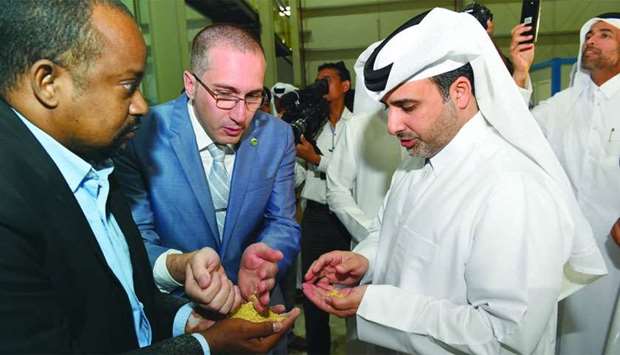*Qatar makes giant strides in food security initiative
Qatar has achieved 100% self-sufficiency in the production of live poultry, meat and dairy products, HE the Minister of Municipality and Environment Abdullah bin Abdulaziz bin Turki al-Subaie has said.
He also noted that the country has attained 24% self-sufficiency in vegetable production and this is expected to reach 70% over the next five years.
There are comprehensive plans to determine the production ratio in each area within the next five years, he added.
Stressing the keenness of His Highness the Amir Sheikh Tamim bin Hamad al-Thani to support food security projects in both the public and private sectors, HE al-Subaie on Thursday said there are plans for both agricultural and animal production.
He made the observations while speaking to reporters on the sidelines of the opening ceremony of an agricultural and livestock production project of Mazzraty - the National Group for Agricultural and Animal Products on Thursday.
He said there are other similar projects scheduled in the future and also referred to the opening of a number of projects since the beginning of the ongoing blockade. Other projects are under implementation in the fields of fodder, poultry farming, milk production and fish farming as well as other food security projects.

A view of a section of the Mazzraty project. PICTURE: Ram Chand
Al-Subaie praised the Mazzraty project for agricultural and livestock production and said it is a model for investing in this vital and important sector, especially as the project has been implemented and designed to the highest quality standards across its various components and technical details in order to make a significant contribution to food security in Qatar,
He added that such projects should be considered and all necessary requirements pertaining to storage, quality and product safety must be ensured.
Meanwhile, the Minister said the number of participants in the seventh Qatar International Agricultural Exhibition (AgriteQ), which will begin next Tuesday and coincide with the first environmental exhibition, has doubled, pointing out that the events will witness the signing of a number of agreements and memorandums of understanding.
AgriteQ is particularly important as a strategic platform to explore new horizons for upgrading the Qatari agricultural sector as a food security pillar, which is a strategic priority for self-sufficiency.
The Qatar International Environmental Exhibition (EnviroteQ) will be an effective platform for introducing innovative environmental solutions to meet current and emerging challenges and an opportunity to share international experiences.
Head of the animal wealth department at the Ministry of Municipality and Environment, Abdulaziz Zeyara, said Mazzraty is one of the successful projects implemented within the framework of Qatar's food security plan. He noted that other similar initiatives will be announced during AgriteQ.
The total number of livestock in Qatar is 1,589,000 heads, of which 1mn are sheep and 400,000 goats, while the rest are distributed among other varieties, he said.
Qatar Development Bank (QDB) CEO Abdulaziz bin Nasser al-Khalifa said the project is one of the public-private partnership initiatives and represents an important focus of the mechanism for supporting food security in Qatar. The project has a role in providing a number products to help achieve food security and provides the market with a large part of its poultry needs.
Al-Khalifa said QDB has three programmes for livestock support, farm support and agricultural resources and fisheries support, all of which play a major role in supporting entrepreneurs and achieving food security.
Chairman of the National Company for Industrialisation and Marketing of Food and Agriculture Abdulrahman Hamad al-Mana said the project came from the directives of His Highness the Amir, calling for self-reliance and self-sufficiency in the production of food and medicine, diversification of resources and achieving economic independence.
He said the project was established at a cost of QR412mn across an area of 2mn sqm and will produce 7mn birds annually in the first stage, thus achieving self-sufficiency in the production of broiler chicken in the current period. The integrated project contains a feed processing unit with a production capacity of 175,000 tonnes per year, a completely automated slaughter system that can handle 6,000 birds per hour, a hatchery with a capacity of 14mn and a plant for organic fertilisers.

